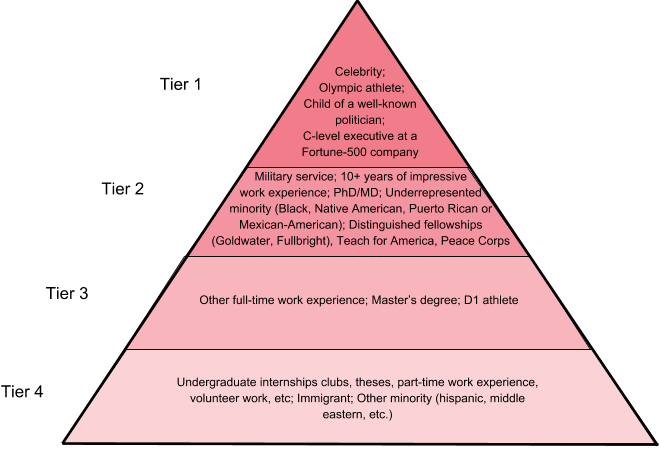If you want to go to law school, your first step is to crush the LSAT. Now you may be thinking, “Well, I’m good at standardized tests. In the past, I never really studied much, and got strong scores, so I don’t think I need to study too hard for the LSAT.”
WRONG, WRONG, WRONG!!
Unless you’re some sort of LSAT savant who can magically score a 175 on their first try, you have room for improvement. The LSAT is a very learnable test. With proper studying, I find that most people can score 10+ points higher on the LSAT than their diagnostic cold score. I managed to go from a 155 to a 167 with three months of self-studying. When each point on the LSAT is potentially worth thousands of dollars in scholarship money, you owe it to yourself to get the best score possible. No pressure.
You have 3 main options when choosing how to prepare for the LSAT:
- An IRL course
- An online course
- Self-studying
I chose the self-studying route (mostly because it’s the cheapest), so I can’t really speak on the structured courses. Most courses run for about three months, for good reason. Three months is a sort of sweet spot where most people reach their optimal scores. Therefore, plan to start studying three months ahead of your anticipated test date. If your test date arrives but you think you still have room for improvement, you can always take it, then keep studying and retake.
Diagnostic
Before you start studying, your first step is to take a cold diagnostic test. This will give you a starting point, and then you can see how much you improve over time. When you take practice tests, the only way to go is to use real tests that were administered in previous years. Luckily, LSAC has been so kind as to provide us with a free one! The June, 2007 LSAT is the only free test out there, which makes it great to use as your diagnostic before you even spend a dime on test prep.
As you will do with your future practice tests, make sure to strictly keep to the time constraints and do it all in one sitting. Also, you should be filling in your answers on the attached bubble sheet. You want to mimic the conditions of the actual test day as closely as possible.
After your diagnostic test, you will have a score as a starting point, and understand the format of the test. Now, it is time to start learning. You will need a lot more practice tests, along with some other study materials to help you better understand the test.
Preptests
Luckily, Amazon sells official LSAC books that each contain 10 previously administered LSATs. Thankfully, they are not too expensive, and each book ranges in price from $17-$25. These are BY FAR the most valuable study materials you will use. I wound up purchasing five of these books and I used them all.
The newer tests will be more valuable to you. The tests questions evolve slightly over the years, so learning from the newest tests will make you better prepared for the real deal. I recommend starting with book 5 first. It is the second most recent book. I would save book 6
first. It is the second most recent book. I would save book 6 , the newest book, for doing full-length practice tests as you get closer to your test date.
, the newest book, for doing full-length practice tests as you get closer to your test date.
Once you have some real tests to work with, do a lot of section drilling, interspersed with full-length practice tests when you have the time and energy. By section drilling, I mean sitting down and timing yourself 35 minutes to do a single section. Then, score it and review your answers. Try to figure out why your wrong answers are wrong, and LSAC’s provided answer is correct.
I worked full-time when I was studying for the LSAT. Most days, I would come home from work, and drill one or two sections, which would be the extent of my LSAT prep for the day. Usually, I would do one full-length practice test on a weekend morning. I found this schedule to be very manageable, as my job was very 9-5 and I never had to work late hours. If you have a more demanding job and/or family life, you may have to give yourself more than three months to prepare.
Logical reasoning and reading comprehension
So you have a bunch of practice tests, but you need some other materials to help you better understand the test. To work on my LR and RC scores, I used Barron’s LSAT book . Why? Because I was able to borrow it for free at my library (Note: When shopping for LSAT materials don’t cheap out! Each point you score could be worth thousands of dollars, so invest in the best possible materials).
. Why? Because I was able to borrow it for free at my library (Note: When shopping for LSAT materials don’t cheap out! Each point you score could be worth thousands of dollars, so invest in the best possible materials).
I do not think the Barron’s book is the best tool out there to improve your LR and RC score. They use “sample” LSAT questions as examples. They are not the real deal since they are questions that the Barron’s editors made up, as opposed to real LSAC-written questions, which you can only get from buying previous tests. It is important to learn from real LSAC questions, because the LSAC, not Barron’s, will be creating the test you take in three months. That being said, this book did give me a better grasp on the LR and RC sections, and helped me improve my scores.
Logic games
If you struggle with the logic games, you’re in luck! They are the easiest section to improve, and most people can get near-perfect scores with the right prep.
There is an app called 7sage. Download it now! They have a full-blown test prep course you can enroll in, but they also have free videos that diagram and explain every logic game in existence. After I drilled an LG section, if any games gave me a particularly hard time, I would watch the video, and everything would click into place. I learned how to diagram properly just from watching these videos.
About halfway through my prep I bought the much-hailed PowerScore Logic Games Bible . It’s definitely a good tool and worth the hype, though 7sage had already taught me a lot about logic games, so the Bible just helped me fill in a few gaps.
. It’s definitely a good tool and worth the hype, though 7sage had already taught me a lot about logic games, so the Bible just helped me fill in a few gaps.
The only way to get better at logic games is to practice, practice, practice. I did almost every logic game in existence. You may want to buy Preptests book 4 , book 3
, book 3 , book 2
, book 2 , or even book 1
, or even book 1 just to drill the logic games. Once again, I recommend trying to prioritize the more recent tests as the games have changed over time. You will likely drill some LR/RC sections in some of these books as well, but I used the older ones primarily for LG drilling.
just to drill the logic games. Once again, I recommend trying to prioritize the more recent tests as the games have changed over time. You will likely drill some LR/RC sections in some of these books as well, but I used the older ones primarily for LG drilling.
Retakes
The best predictor of your actual LSAT is the average of your 5 most recent practice tests. There is usually a range of +/- 3 points that you will score on any given day. The average of my practice test scores leading up to the test was 167, and lo and behold, I scored a 167 on the real deal. However, I had scored as high as 172 on some of my practice tests. I felt that I owed it to myself to retake the LSAT. Though I felt I had reached the peak of my LSAT potential, there was essentially a 50% chance I could score even higher than a 167 next time. If I scored lower, it would not really be a big deal, as most schools only care about your highest score.
Though I planned to retake the LSAT in December, I missed the registration date!! Do not make my same mistake! Calendar all of the registration deadlines. They really sneak up on you.
The next test was not offered until February, which would be really late, and a lot of schools would not even accept a February score for that year. I made the decision to just submit my apps with a 167, but I will always wonder “what if I was able to score a point or two higher?”
Once you get your first score back, if you think you still have more to learn, or your score was below your practice test average, retake! If you follow my law school timeline in my last post, you will have ample to to retake. Unless you think your score represents the top of your potential, you should retake the test.
It has been 9 months since I last cracked open an LSAT book, and let me tell you, I do not miss it. For those just beginning their LSAT journey, good luck! It is hard work, but you will soon begin to see the results of your efforts. I recommend checking out reddit.com/r/lsat. They talk about a lot of great study resources, and you can join a whole community of people going through the same process as you.
For my seasoned LSAT vets, I would love to hear about what worked for you! Let us know in the comments what advice you have for LSAT newbies.


















